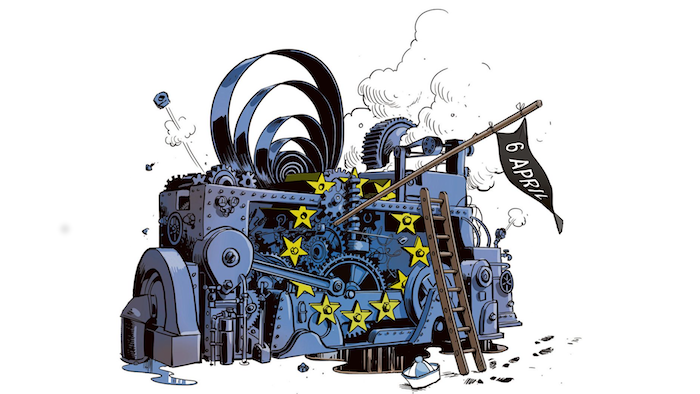The vote was promoted by three eurosceptic organisations led by the group GeenPeijl, itself an outgrowth of a popular blog GeenStijl. They collected more than 400,000 signatures to secure the referendum. The latest polls show that half of all voters have not yet decided whether to vote and, among those who will, ‘yes’ and ‘no’ supporters are neck and neck.
The result has no binding significance, but it seems clear that a ‘no’ vote would be a new blow for the EU, currently battered by a wave of hostility from citizens. The government and traditional parties would also suffer, since all are supporting the ‘yes’ campaign.
“The EU’s adversaries see the referendum as an opportunity to boost social grumblings about the EU,” argues NRC Handelsblad. For the Dutch daily,
that should not be surprising: few people are ultimately interested in Ukraine, but most have an opinion on the EU. Whatever the result, it is clear the referendum will make it more difficult for the EU to begin new projects without consulting European public opinion. Whether Brussels welcomes the referendum or not, it does pose a valid question: do we want a powerful and ambitious EU or not? The ‘yes’ camp has two main arguments. First, the Association Agreement is an ordinary commercial treaty, one that does not give Ukraine back-door access to the EU. [...] Second, rejecting the treaty would bring Russia back into the picture.
Receive the best of the independent European journalism straight to your inbox every Thursday
Despite the fear that a ‘no’ victory would be “a gift for Vladimir Putin”, who has “annexed the Crimea, supported rebels in the east of Ukraine and is probably jointly responsible for the destruction of the MH17”, as Rob de Wijk writes in Trouw, NRC argues that “the third world war is not going to break out if the Dutch vote ‘no’.”
Nevertheless, the referendum does “rub salt on the wound,” NRC adds:
the time is gone when the EU could put in place important projects without consulting the public and without the direct involvement of the population. The German Chancellor Helmut Kohl could impose the euro on Germans in the 1990s like a little dictator, just as the expansion to central and eastern Europe was carried out without any large-scale public debate. In 2005, the European elite could still ignore the French and Dutch rejection of the European constitution.
For the daily —
a growing number of Europeans are currently critical towards the EU and are trying to get the message across to the Brussels elite. During the last European elections, almost one in three voters voted for eurosceptic parties (including the PVV, the FN, FPÖ and Syriza), but that was not enough, “ever closer union” is still the order of the day. European citizens have found another way: in the UK, through the In/Out referendum on the EU, in the Netherlands through the referendum on Ukraine. This will encourage enthusiasm for direct participation in citizens’ initiatives; a series of referendums on the free trade agreement with the US (TTIP) and on Turkey’s membership of the EU therefore seem inevitable.
“A direct result of growing criticism of the EU, coming from both the right and left,” the Dutch referendum on Ukraine would therefore be a chance for the EU’s leaders to “accept the fact the the political rulebook has changed since 2008,” instead of “threatening the apocalypse”, because “the old story that politicians and managers always know better than the people no longer holds true,”
The EU as a whole has “lost credibility” because its earlier projects led to “too many people losing out.” That is why, NRC argues, “it needs the possibility of Brexit or a possible rejection of the Ukraine treaty”: these are as much signs of the fact that “anti-establishment sentiment is growing and is the prelude to a new phase in the development of the EU’s post-national democracy.”
Do you like our work?
Help multilingual European journalism to thrive, without ads or paywalls. Your one-off or regular support will keep our newsroom independent. Thank you!












